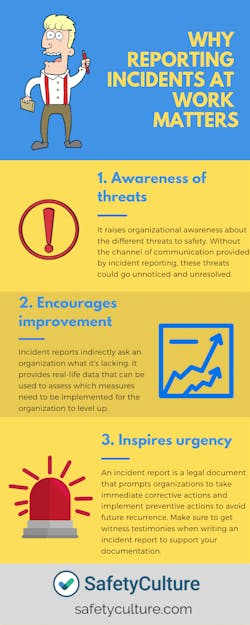The concept of incident reporting has been around for quite some time now. Though it was designed to improve safety in the workplace, there are still a number of reasons employees refuse to comply avoid this. Management and frontline workers need to understand why reporting an incident makes a big difference in the safety, efficiency and overall well-being of the organization and its members.
Awareness of threats
Reporting incidents is essential since it raises the organization’s awareness about the things that can go wrong so that corrective and preventative actions can be taken promptly. This applies to industries involving manual labor, manufacturing with heavy machinery, office work, and many others. Without the communication channel provided by incident reporting protocols, a variety of threats to safety could go unnoticed and unresolved.
Threats such as:
- Faulty or malfunctioning machinery/equipment
- Improper behavior (sexual harassment, bullying, showing up to work under the influence of alcohol or banned substances, etc)
- Lack of safety equipment, training, and controls
Encourages improvement
Incident reports are thinly-veiled questions about what the workplace is lacking. Often, seemingly minor incidents are symptoms of a much bigger problem. Such reports provide valuable, real-life data to management who can use it to assess whether additional training, better equipment, and/or new strategies are needed for the organization to level up.
Inspires urgency
Simply mentioning something unusual that happened at work doesn’t exactly give it an air of seriousness and urgency. An incident report is a legal document that prompts organizations to take immediate action for resolution. When writing incident reports, get as many witness testimonies as possible to support its legitimacy and ensure that something is done to prevent future recurrence.
It is crucial that incidents are reported immediately or at least within the day of its occurrence, regardless of its severity. An incident report form is used to gather the details of an incident for formal documentation and investigation. Incident reporting doesn’t only benefit an organization by improving safety. It’s a vehicle for all-encompassing growth and improvement.
About the Author
Juhlian Pimping
Juhlian Pimping is a content writer for SafetyCulture, a software company that enables businesses to perform inspections using digital checklists.

